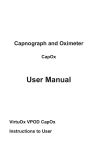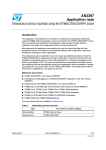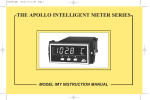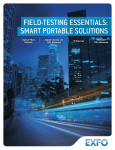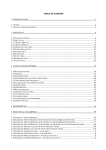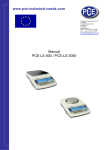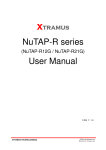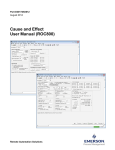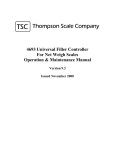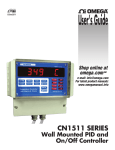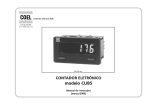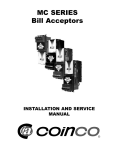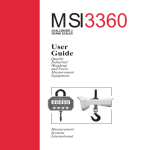Download User Manual - Affordable Scales & Balances
Transcript
Pennsylvania Scale Co.
1042 New Holland Ave.
Lancaster PA 17601
800-233-0473
www.pascale.com
INSTRUCTION & SERVICE MANUAL
7600E Digital Indicator
V2.84
Part# 12199
TABLE OF CONTENTS
SPECIFICATIONS………………………………………3
INSTALLATION…………………………………………4
SETUP ACCESS………………………………………..5
MENU LAYOUT...………………………………………6
CONFIGURATION……………………………………..7
REMOTE SERIAL DISPLAY………………………….8
CALIBRATION………………………………………….9
SERIAL PORTS………………………………………10
SERIAL COMMUNICATIONS……………………….11
ANALOG OUTPUT……………………………………13
DIGITAL INPUT/OUTPUT……………………………15
SETPOINTS……………………………………………16
OVER/UNDER…………………………………………17
BATCH MODE…………………………………………18
SERIAL COM. SETPOINT/ACC……………………...19
TIME & DATE………………………………………….20
WEIGH IN/OUT………………………………………..21
SMART SERIAL……………………………………….23
ASCII CHART………………………………………….28
DISPLAY MESSAGES………………………………..32
115/220 VAC…………………………………………..33
SPARE PARTS………………………………………..34
2
SPECIFICATIONS
Smart Serial Setup: 8 custom print files plus 8 macro files, 30 characters each.
Batch Start/Stop: Control from front panel or remote input.
Setpoint Operation: 4 output relays configurable for normal setpoints, over/under or
manual/auto batch modes.
LOAD CELL A/D CONVERTER
TYPE: 24 bit delta sigma
EXCITATION: 5 VDC, 120 mA max.
SIGNAL INPUT: 16 mv
SENSITIVITY: 0.1 uV/grad
UPDATE RATE: 30 update/second
DISPLAY: Six (6) Decades, 0.6 inch LED
KEYPAD: Full numeric plus controls
POWER INPUT: 117/217 VAC, 50-60 HZ, 20 watts, fuse 0.25 A Slo-Blow.
SERIAL PORTS:
Port 1: RS232C or 20ma
Port 2: RS485, RS232C or 20mA.
ENCLOSURE: Stainless Steel, NEMA 4x, Tilt - Stand Base, 7lbs.
CASE: 9” (w) x 6.44” (h) x 4” (d) Tilt or panel mount.
OPTIONS:
TIME & DATE: 12/24 hr, battery backed.
ANALOG OUTPUT: 0-10v, 4-20ma (16 bit D/A).
DIO: 4 AC/DC – inputs, 4 AC outputs (SS Relays, 0.5 amp)
Optional Case: 10” (w) x 6.5” (h) x 4” (d) Tilt only.
Panel Mount: Kit (replaces tilt stand).
3
INSTALLATION
POWER WIRING: The indicator is designed to be operated from 117/217 VAC, 50-60 Hz. The
unit power cord must be plugged into a grounded 3 - wire polarized AC wall socket. All normal
wiring and grounding precautions should be observed, including use of a "clean" AC power
line.
SCALE WIRING:The unit is equipped with cable gland entry for load cell cable insertion and
internal (pluggable) terminal strip for 4 / 6 wire connection. Remove sense jumpers P11-8/7,
P11-6/5 for six wire.
P12
F1
0.25A
SB
Transformer
Line
Filter
Shielded
A/D Converter
12
A
J1
B
SW4
P5
8 7
6
EW-1000 Rev…..
Excitation +
Sense +
Excitation –
Sense -
6 5
5
4
CAL
P11
3
2
1
TB-1
Signal +
Signal -
4
SETUP ACCESS
To access instrument configuration, calibration or to enable options, depress the “Zero” key for
five seconds.
The Audit Trail counters (“Pxxxx” and “Cxxxx”) are displayed first followed by access code
request (“AC?”). The initial factory setting is “0000” which can be entered with four steps of the
“Gross/Net” key (“AC0000”) and “Print”. If no entry is made, instrument returns to operate
mode.
The access code can be changed to any four digit combination during setup exit when display
again shows “AC?”.
The “Check” key provides the software version “V 1.XX” followed by the display test routine.
Use the “ENT” key to advance to the keyboard test and to exit tests.
After entry, use the “Tare Recall” key to select a main menu; configuration (“SEL.CFG”),
calibration (“SEL.CAL”), or options (“SEL.OPX”) and “Start/Stop” to back step.
The “Gross/Net” key enters selected menu and is used to step through sub categories.
Individual parameter selection is made with the “Tare/Recall” key, which then steps through
the parameter choices (“Zero” key back steps within the menu).
The “ENT” key is used at any point to “back” up from categories to menus and to “save?” and
“AC?” and exit.
During the exit steps, if changes were made, the display is “save?” with alternate “no”. To save
changes, use the “Units” key to select “yes” and “ENT” to exit.
Calibration numeric entries are entered directly followed with the “ENT” key.
Front panel access is inhibited if conventional “sealing” is applied by
setting jumper J1-1 in the B position. The board mounted “CAL” button is
then used for access.
5
Menu Layout
CFG
Configuration: Divisions, count by, decimal, over
range, filter, AZM, zero range, ISM, lb/kg, serial port
selection, DIO enable
CAL
Calibration: Zero, Span
OP1
Analog Output: Gross, Net, Display; Zero, Span, Trim
OP2
Setpoint DIO: Setpoint, Over/Under, Manual / Auto Batch
OP3
Time & Date: 24 hr, 12 hr, Print format
OP4
Weigh – In / Weigh – Out: Truck mode
OP5
10 Point Linearity, Filter selection
OP8
OP6
Totalizer
AC/DC Battery
OP7
Smart Serial
6
CONFIGURATION: “SEL.CFG” Use Gross/Net to enter the menu and step to each category,
Tare Recall to select parameters. ENT to return to menu selection.
Capacity is the combination of “1”, “2” and “3”.
Example: 1__100, 2___2 and 3__0.0 = 2,000 x 0.2 lb
Step
Parameters
Definition
Number of divisions x100
100 = 10,000 divisions
Count by selection
10,000 divisions, count by 2 = 20,000
1
5, 10, 15, 20…100, 120…1000
2
1, 2, 5, 10, 20, 50, and 100.
3
0, 0.0, 0.00, 0.000, and 0.0000
Decimal point selection
4
105P, 9 d (105% or 9 divisions)
Overrange selection
5
1, 2, 3, 4, 5, 6, 8, 10, 12, 15……90
Digital filter selection (averaging)
6
off, 0.5, 1, 3, 5, 10 (divisions)
Auto Zero Maintenance (AZM)
7
1.9, 5, 10, 20, FS (% of capacity)
Zero range selection
1.9% of 2,000 x 0.2 = 38.0 lb
7.1
off, on (ISM)
Zero’s scale on power-up
8
off, 1, 3, 5,10 (divisions)
Motion Band selection
9
lb, kg, con
Units selection and convert
10
nt, Gtn, n.nt, n.Gtn.
Port 1 serial output selection
nt display only, Gtn is Gross Tare Net
and n.nt/n.Gtn inhibit negative gross
printing
11
off, co, de
Off, Continuous, or Demand
12
7o, 7E, 8n
7- odd, 7- even or 8- none
13
12, 24, 48, 96
Baud rate selection
14
off, 1, 2, 3, 5, 10, 15 (seconds)
19
A, b
20
nt, Gtn, n.nt, n.Gtn
Port 2 serial output selection
21
off, co, de, Ln
Off, Continuous, Demand, Network
22
7o, 7E, 8n
7- odd, 7- even or 8- none
23
12, 24, 48, 96
Baud rate selection
24
off, 1, 2, 3, 5, 10, 15 (seconds)
Delay between lines or continuous
output.
25
1 – 16 (RS485/RS422)
Network address selection
30
off, on
DIO Inputs
Delay between lines or continuous
output.
A : adds “STX” in continuous
b : No “STX” in continuous
7
Remote Serial Display (RSD) Option
In RSD mode the instrument can be set to work with another unit as a “remote” either as the
main or the slave unit. Communication is pre-set for channel two only on both units.
(RS232, 9600, 8, none)
When in remote mode, re-access to the following selections requires using the internal “cal”
switch.
Remote unit can have full or partial control of the main unit. Devices are available to replace
the cable for wireless communication.
40
rd.OF,
rd.En,
rd.re
rd.En : Selects Indicator as Remote Display (RSD)
rd.re : Allows indicator to operate w/RSD
41
En.On
Allow remote keypad operation
42
Zr.On
Enable/Disable zero key
43
tr.On
Enable/Disable tare key
44
Un.On
Enable/Disable unit key
45
46
Print function with parameter “11” see below
Fn.On
11.P1.xx
Enable/Disable all other functions
45.Pr.xx
RSD Serial Port 1
RSD Print Key
off
off
Disabled
Disabled
off
on
Disabled
Sends print cmd to weigh meter
co
off
Sends co serial
Disabled
co
on
Sends co serial
Sends print cmd to weigh meter
dE
off
Disabled
Disabled
dE
on
See right…..
Outputs demand format from
RSD serial port 1
8
CALIBRATION: “SEL.CAL” Use Gross/Net to enter the menu indicated by a flashing “C” on
the left and live weight is displayed. Scale zero (dead load) or adjusting span (single or multipoint) are independent. Therefore either can be done and repeated as necessary before
exciting calibration. If an error has been made, exit without “storing” will return to prior setup.
KEY (FUNCTION)
DISPLAY
(Live weight 123 lb)
“C”__123
Zero (acquire dead load)
(live weight 5000 lb)
Definition
Cal mode scale reading
“------“ to “C___0.0”
“C”__4995
acquires new dead load
Scale reading with load
Enter numeric value directly:
(Adjustment complete)
005000
adjusted value
Then ENT:
(adjust span)
“------“ to “C” 5000
displays new span
Repeat as required then ENT to exit CAL
“Save ?” “No” or “Save ?” “Yes” use Units to select and ENT to store “yes” with changes or
“no” to exit without changes.
Continue with ENT to “Ent AC” which allows access code change by entering a new four digit
code and ENT or ENT with no entry to maintain current password.
Option 5 Ten point calibration: Allows up to 10 span points (pt1…….pt10). Zeroing the scale
clears the existing values. Points are assigned incrementally with error indication if the addition
is not above the prior point or exceeding scale capacity.
Filter selection included for rolling or box averaging.
5.1
OFF, On
Enable 10 point span
5.2
A, b
A : Rolling average
B : Box average
9
SERIAL PORTS
Port 1: RS232 duplex (Rx,Tx), 20ma (Tx).
Port 2: RS232 duplex (Rx,Tx), 20ma (Rx,Tx), RS485, or RS422.
Note: Position jumper on J2 for Port 2 receive selection.
GND
1
Tx1, RS232
2
Rx1, RS232
3
Tx2, RS232
4
Rx2, RS232
5
Tx1, -20ma
6
Tx1,Tx2,+20ma (5 vdc)
7
A-RS232
B-20ma
C-RS485
D-RS422
Tx2, -20ma
8
J2
Rx2,+20ma
9
Rx2, -20ma
10
B, RS485, RS422-Tx
11
A, RS485, RS422-Tx
12
B, RS422-Rx
13
A, RS422-Rx
14
GND
15
O1
EW-1000 Rev…
10
Rx2
Serial Communications
Remote Commands
<Z><cr>
Zero Scale
“Gross” mode, no motion, inside zero range.
<N><cr>
Switch to Net
“Gross” mode with Tare stored.
<G><cr>
Switch to Gross
“Net” mode.
<T><cr>
Auto Tare
Switch to Net, no motion, not at “Gross” zero.
<P><cr>
Print
Valid display, No motion
<U><cr>
Units
Change units
Data Formats
Demand Mode: <stx><pol><DATA><sp><lb/kg><sp><GR/NT><cr/lf>
Continuous Mode: <stx><pol><DATA><L/K><G/N><status><cr/lf>
Brackets “<>” are not sent
stx:
“Start of Text” character (ASCII 002) (can be removed in continuous: config 19)
pol:
Polarity sign, “SPACE” (ASCII 032) for positive or (-) sign (ASCII 045) for negative
sp:
Space character (ASCII 032)
DATA: Seven (7) digit data field including decimal point or fixed (dummy) zero if selected.
“Leading Zero Suppression” with leading zeros transmitted as “space” characters.
lb/kg: Two (2) character field data identification for weight units, in demand (printer) mode.
Weight in lb = “lb” (ASCII 108,098), weight in kg = “kg” (ASCII 107,103)
L/K: One (1) character field data identification for weight units in continuous (computer)
mode.
Weight in lb = “L” (ASCII 076), weight in kg = “K” (ASCII 075)
GR/NT: Two (2) character field data identification for weighing mode in demand (printer)
mode.
Gross Mode = “GR” (ASCII 071,082), Net Mode = “NT” (ASCII 078,084)
11
G/N: One (1) character field data identification for weighing mode in continuous
(computer) mode.
Gross Mode = “G” (ASCII 071), Net Mode = “N” (ASCII 078)
status: One (1) character data identification used in the continuous (computer) output
mode to identify the status of the indicator. Characters are listed below in order of
priority.
Calibration/configuration
Over/Under Range
Motion
Center of Zero
None of the above
cr/lf:
<D> (ASCII 068)
<O> (ASCII 079)
<M> (ASCII 077)
<C> (ASCII 067)
<sp>(ASCII 032)
Two (2) character field, “Carriage Return” (ASCII 013), “Line Feed” (ASCII 010)
Guidelines for Serial Output:
Demand format will inhibit “print” when scale is in “motion” or with negative “Gross” weight, even
in “Net” mode (based on setting “CFG 10”).
Local Network Protocol:
Command to the indicator:
<*><DD><00><cmd><data entry><CR>
Response from indicator:
<:><00><DD><cmd echoed><data resp><CR>
Where: (<,> brackets not sent)
*
= Message from master (2AH)
DD
= Indicators address
00
= Master address (fixed at 00)
CR
= Message terminator (ODH)
:
= Response from indicator (3AH)
cmd
= Command to indicator
cmd ech = Command echoed from indicator
data ent = Data entered into indicator
data resp = Data response from indicator
12
OPTION 1: Analog Output
0 – 10 Vdc or 4 – 20 ma, select with jumpers J1 and J2
P12
F1
0.25A
SB
Transformer
Line
Filter
EW-1000-AOUT
P5
12
A
J1
B
TB 20
J1
V
1
-
I
8 7
EW-1000 Rev…..
6
4
V
2
+
6 5
5
J2
I
P11
3
2
1
TB-1
- +
0 – 10 Vdc or 4 – 20 ma
Position J1 & J2 for V/I
13
Option 1 Analog Output: “SEL.OP1” Use Gross/Net to enter the menu and step to
each category, Tare Recall to select parameters. ENT to return to menu selection.
DISPLAY
Parameters
1.1__Gr
Gr, Net, DSP
Definition
Analog tracks gross, net or display
“1.5__Zr” “000” (flashes current analog starting point)
Adjust value and ENT to adjust starting point.
“1.6__FS” “500” (flashes current analog span point)
Adjust value and ENT to adjust full scale.
1.7__ZrA
While monitoring the output, use Start/Stop to decrease, Tare Recall to
increase the analog reading (Zero trim digi-pot).
1.8__FSA
While monitoring the output, use Start/Stop to decrease, Tare Recall to
increase the analog reading (Span Trim digi-pot).
ENT to exit OP1.
14
OPTIONS 2: DIO
AC Inputs; D1, D2 are not installed, J1 = short (underside), J2 = open, R1 – R4 = 18k
(3w, 5%, flame proof).
DC Inputs; D1, D2 are installed, J1 = open (cut trace), J2 = short, R1 – R4 = 1.5k (1/2w,
5%, carbon film). AC Outputs; Solid State Relays, 120VAC, 0.5A.
TB 30
COM
1
COM
2
IN 1
3
IN 2
4
IN 3
5
IN 4
6
D1
D2
K1 OUT 1
J1
J2
EW-1000-DIO
P4
1
2
K2 OUT 2
3
4
5
K3 OUT 3
K4 OUT 4
6
7
8
TB 31
EW-1000 Rev…
.
Option 2 DIO: “SEL.OP2” First select the operating mode for “Setpoint”, “Over/Under”,
“Manual or Auto Batch”. After setup, the parameters for the selection are entered from
15
the weighing mode.
Use Gross/Net to enter the menu and step to each category, Tare Recall to select
parameters. ENT to return to menu selection.
Note: external Inputs are enabled in Configuration with “CFG 30”.
DIO Inputs can be configured for 120vac, 5vdc or dry contact.
Normal
Batch
IN 1
Gross/Net
Stop
CFG 30 off
Batch
n/a
IN 2
Tare
Start
n/a
IN 3
Zero
Zero
IN 4
Print
Print
Bypass
Ing 1
Bypass
Ing 2
DIO Outputs are 120vac (0.5 amp) or optional 24 vdc, based on operating mode:
Dual
Setpt 1
Setpt 2
Ov/Un
Man B
Auto B
Out 1
Setpt1-A
Main 1
Main 1
Low
Main 1
Main 1
Out 2
Setpt1-B
Fast F1
Fast F1
Accept
Fast F1
Fast F1
Out 3
Setpt2-A
Tol
Main 2
High
Main 2
Main 2
Out 4
Setpt2-B
Zero B
Fast F2
Zero
Zero
Fast F2
Checkweigher “Bar” graph legends:
Ck1-3
Out Low
Low
Accept
High
Out High
Setpoint values are entered from “Weighing Mode” by the SET key and direct numeric
entry.
Weight errors of any kind (e.g., ol, ul, etc) will de-energize all relay outputs and abort a
batch if one is in progress.
Four outputs are available to use as two setpoints with main and fast feed, single
setpoint main and fast feed plus tolerance and zero band. Also Pre-Act can be applied
to the main, for material in-flight compensation.
Step
Parameter
Definition
16
2.0
OFF, SP, OU.UN, bAt1, bAt2
Mode select: setpoint, over/under (check
weighing), Manual Batch, Auto Batch
2.0
SP
Setpoint
2.2
Off, s1, s1.p, s1.d, s.p.d, Dual
Setpoint. 1 + pre-act, + drib, + both, Set1-A&B.
2.3
Gr, nt, dSP, Count
Setpoint 1 tracks Gross, Net, Display, Count
2.4
POS, ZER
Output on below reading (POS), inverted (ZER)
2.6
Off, s2, s2.p, s2.d, s2.p.d, tOL,
Dual
Setpoint. 2 + pre-act, + dribble, + both,
Tolerance, Set2-A&B.
2.7
Gr, nt, dSP, Count
Setpoint. 2 + pre-act, + dribble, + both
2.8
POS, ZER
Output on below reading (POS), inverted (ZER)
2.10
ZbO
Zero band output (input weight value)
2.11
Off, On
SP1.trG (Target) = 1000
SP1.PrE (Pre-act) = 5
example
SP1.drb (Dribble) = 10
s.p.d
Hysteresis, provides 3 grads to prevent relay
chatter
Main and Fast Feed are on until reading reaches
990, then Fast Feed turns off and Main continues
until Pre-act at 995
2.0
OU.UN
Over/Under – check weighing
2.2
Off, HL, tGt, Ck1, Ck2, Ck3
High/Low band, Target and +/- band, Check
Weigher 1-3.
2.3
Gr, net, dSP
Outputs track Gross, Net, Display
2.4
POS, ZER
Invert low
2.5
POS, ZER
Invert accept
2.6
POS, ZER
Invert high
2.10
ZbO
Zero band output (input weight value)
2.11
Off, On
Hysteresis, provides 3 grads to prevent relay
chatter
2.12
Off, On
Enables “Bar” graph legends
Low = 950
High = 1050
Target = 1000
tGt
Low = 50
example
High = 50
HL
example
Note:
Then low is on until 950, then accept is on until
1050 and high is on above 1050.
Outputs match above example for HL
Batch printouts are from Port 1
only
17
Bat 1
Manual Batch mode, pauses between setpoints
2.1
Prn, tAr, dln
7400 uses print, tare or external (DIO) for start.
Pressing any key other than “start” will pause and
a second push will abort. 7600E uses Start/Stop
panel switch
2.2
Off, s1, s1.p, s1.d, s.p.d
Setpoint. 1 + pre-act, + dribble, + both
2.3
Gr, nt, dSP, Count
Setpoint 1 tracks Gross, Net, Display, Count
2.4
POS, ZER
Output on below reading (POS), inverted (ZER)
2.6
Off, s2, s2.p, s2.d, s2.p.d
Setpoint. 2 + pre-act, + dribble, + both
2.7
Gr, nt, dSP, Count
Setpoint. 2 + pre-act, + dribble, + both
2.8
POS, ZER
Output on below reading (POS), inverted (ZER)
2.10
ZbO
Zero band output (input weight value), available if
S2 dribble not used
2.0
Bat 2
Auto Batch mode, continues without pause
2.1
Prn, tAr, dln
7400 uses print, tare or external (DIO) for start.
Pressing any key other than “start” will pause and
a second push will abort. 7600E uses Start/Stop
panel switch
2.2
Off, s1, s1.p, s1.d, s.p.d
Setpoint. 1 + pre-act, + dribble, + both
2.3
Gr, nt, dSP, Count
Setpoint 1 tracks Gross, Net, Display, Count
2.4
POS, ZER
Output on below reading (POS), inverted (ZER)
2.5
Off, 1, 2, 3, …., 10
Time Delay (settling) before print
2.6
Off, s2, s2.p, s2.d, s2.p.d
Setpoint. 2 + pre-act, + dribble, + both
2.7
Gr, nt, dSP, Count
Setpoint. 2 + pre-act, + dribble, + both
2.8
POS, ZER
Output on below reading (POS), inverted (ZER)
2.9
Off, 1, 2, 3, …., 10
Time Delay (settling) before print
2.10
ZbO
Zero band output (input weight value), available if
S2 dribble not used
2.0
Relay override command: <RLY> K(1-4) State (0=off, 1=on)
<RLY><0> Reset, restore to normal operation.
<RLY><3><1> Turn K3 on
<RLY><4><0> turn K4 off
Additional Serial Commands: Setpoint/Accumulator
18
Totalizer/Accumulator reset command. Send TC<CR> to reset the totalizer, and the
meter responds with a TC+<CR><LF> string.
Ten/Nine-digit Accumulator Printing/Serial Format Output
COMMAND
TR1<CR> “
Output
57.85 lb”
Description
10/9-digit w/ printable units (e.g., lb or kg)
10/9-digit w/ computer units (e.g., L or K) & A for
TR2<CR> “ 57.85LA”
accumulator.
TR3<CR> “ 57.85”
10/9-digit only
TR4<CR> “0000057.85”
10/9-digit w/ leading zeros
All transmissions are terminated by a CR &LF.
If there is a decimal-point in the accumulator, nine digits are transmitted.
Setpoint Recall:
<S><R><1><CR> Requests value of setpoint 1
<S><R<I><CR><LF>
Response if Setpoint 1 is off
<S><R><1><(><SP><SP><1><0><0><0><)><CR><LF>
if setpoint = 1000
Setpoint Entry:
<S><E><1><(><1><0><0><0><)><CR>
Full-Duplex Setpoint Parameter Entry/Recall
1
2
3
4
5
6
Setpoint
SP-1
SP-2
Setpt-Preact SP-1
Pr-1
Pr-2
Setpt-Drib
SP-1
Dr-1
Dr-2
Stpt-pr-dr
SP-1
Pr-1 Dr-1
Pr-2 Dr-2
Stpt-dual
SP-1-A
SP-1-B SP-2-A
SP-2-B
Output
K1
K2
K3
K4
OP3
3.1
Time & Date
---, 24H, 12A, 12P
Skip time, 24 hour, 12 hour am, 12 hour pm
19
3.2
T1
Set time: hh mm ss
3.3
dA
Set date: mm dd yy
3.4
S.no, no, Let
Month print selection, short numerical
(mm/dd/yy), number 01 thru 12, month spelled
out
3.5
Off, Un, Ab, On
Print under, above or on the same line
OP4
Weigh – In / Weigh - Out
See page 19
OP5
10 Point Linearity
On, Off see page 9
OP6
Totalizer
6.1
Off, On, AU
Enable Totalizer (operates with Batch or Print)
AU: Auto accumulates/prints stable weight
6.2
Off, 1……50
Totalizer reset band
Option 6 Totalizer: Operates with “print” function in normal mode or batch mode.
In normal mode, current value is added to the totalizer with each “Print” command. The
reset band is used to inhibit a double add when not in Batch Mode.
View the Total with the “2” key and during the display (AC..XXXX), the “Print” key is
used to print the total, the “Ent” key returns to weigh mode.
The “Clear” key is used to clear the totalizer by first changing the message from
“Clr.ACC…no” to “Clr.ACC…yes” with the “Units” key and “Ent” to complete. A
“Cleared” message is provided for conformation.
Note: Totalizer works with port 1 only and the “Print” key is disabled when Batch Mode
and Totalizer are both enabled.
OPTION 4: Weigh – In / Weigh – Out
Truck Scale Application: Provides six digit Identification.
20
Operates in “Gross” only.
This mode provides a system for single scale applications to determine net weight by
storing incoming weight and completing the transaction with out going weight.
4.1
Off, On
Turn on Weigh–in / Weigh-out
4.4
1, 2
Select print port 1 or 2
4.5
8n1, 7e1, 7o1
Data setup, 8 bit no parity one stop, 7 bit even
one stop, 7 bit odd one stop
4.6
1200…..9600
BAUD rate selection
4.7
Off, 1, 2, 3
Line feed delay
Note: Print format based on smart serial setup or unlabeled default. Truck ID cannot be
accessed unless there are (min) five grads of weight on the scale.
Full Truck IN
Truck enters scale full, scale indicates “Stable”.
21
Operator inserts ticket and pushes “Print” key.
Display responds with “Id no” prompt.
Operator enters truck “ID Number”, up to 6 – digits.
Operator pushes “Ent” key.
Printer prints:
Time/Date (optional)
(xxxxxx) ID. NO.
(xxxxxx) lb GR
Truck goes to empty load.
Empty truck returns to scale, scale indicates “Stable”.
Operator pushes “Print” key and “Id no” prompt appears.
Operator enters same ID Number as previously printed.
Operator pushes “Ent” key.
Printer prints:
Time/Date (optional)
(xxxxxx) ID. NO.
(xxxxxx) lb GR Recalled
(xxxxxx) lb TR
(xxxxxx) lb NT
Empty Truck IN
Truck enters scale empty, scale indicates “Stable”.
Operator inserts ticket and pushes “Print” key.
Display responds with “Id no” prompt.
Operator enters truck “ID Number”, up to 6 – digits.
Operator pushes “Ent” key.
Printer prints:
Time/Date (optional)
(xxxxxx) ID. NO.
(xxxxxx) lb GR
Truck goes to fill load.
Full truck returns to scale, scale indicates “Stable”.
Operator pushes “Print” key and “Id no” prompt appears.
Operator enters same ID Number as previously printed.
Operator pushes “Ent” key.
Printer prints:
Time/Date (optional)
(xxxxxx) ID. NO.
(xxxxxx) lb GR
(xxxxxx) lb TR Recalled
(xxxxxx) lb NT
Transaction Buffer: Select / Print / Clear / Clear All
22
Select ID:
With “ID” displayed, user can select a stored ID by pressing “Set”
(up) or “Start/Stop” (down) to scroll through the buffer.
Print Buffer:
Pushing Gross/Net with ID displayed will cause output of the
complete buffer ( ID with Tare).
Clear ID:
Pushing clear with ID displayed will clear that ID and step to the
next.
Clear ALL:
With “ID”, holding the clear switch will prompt “Rec.Clr” and using
unit to switch to “yes” and enter will clear entire buffer.
Option 7: SMART SERIAL I/O
The SMART SERIAL I/O option now offers a wide degree of flexibility for an operator to
customize the serial output format for individual system requirements. The custom print
currently supports:
Specifying starting and terminating characters (stx, cr, lf, etc.).
Adding printer control characters.
Custom headers, titles, etc..
Customized parameters such as "GROSS WEIGHT" instead of "GR".
Custom insertion of special parameters such as time/date and identification no.
Truck mode custom printing.
Custom continuous serial protocol.
Custom 'P' print out in duplex mode.
FEATURES:
*
Eight (8) custom print files automatically assigned.
*
Eight (8) macro files for easy setup of headers, titles, etc. .
*
Capability to upload and download the custom print files to a host computer.
*
Maximum file length is 30 characters and/or parameters. Maximum number of
characters in an output string is (250).
Note!Custom print does not support RS485 protocol
STANDARD SERIAL CONFIGURATION:
The SMART SERIAL I/O Option allows standard serial output ports to be modified and
23
imported into the serial output data stream.
CUSTOM PROTOCOL FILE SELECTION:
The selection of the associated custom print file is performed automatically by serial port
and the data mode (GROSS, NET, TOTAL RECALL, or SPECIAL) that the instrument is
currently in at the time of a print. In other words, if Ports 1 & 2 were selected for demand
print (dE) and the instrument was in the "GROSS" mode at the time of a print request of the
data, the serial output for Port 1 would use the contents of file 1 (7.1) and the contents of
file 5 (7.5) for Port 2.
The selections under Option 7 may be divided into three main functional groups; the first 8
files (7.1 to 7.8), each of which can store up to 30 ASCII and/or parameter codes, are files
pertaining to the actual customization of serial output data and are themselves further
subdivided into Port 1 files (7.1 to 7.4) and Port 2 files (7.5 to 7.8), the second functional
group pertains to the 8 MACRO files (7.9 to 7.16) that may be enterd into the primary files
(7.1 to 7.8) by thier associated parameter codes 600 to 607 (7.9 = pararmeter code 600
etc.), each of these files can also store up to 30 ASCII and/or parameter codes.
CUSTOMIZING
FILE
NORMAL
MODE
7.1
Gross data
7.2
Net data
7.3
Total data
7.4
Special
PORT 1
TRUCK
MODE
Truck Mode
Output Port is
selected under
option 4, Port 1
selection mirrors
Port 2 below.
MACROS
(8)
MACRO
Parameter
codes
7.9
600
7.10
601
7.11
602
7.12
603
(for future use)
7.5
Gross data
Truck Entry
7.13
604
7.6
Net data
Truck Out Empty
7.14
605
7.7
Total data
Truck Out Full
7.15
606
7.8
Special
(for future
use)
Truck Fixed Tare
7.16
607
PORT 2
Notes:
If Option 7 is enabled ("on") but a designated file is set to off then that print mode will print
24
its default format (eg. file 7.1 off - the GROSS data from Port 1 is sent out in its default
format).
MACRO FILES (7.9 TO 7.16):
There are eight (8) macro files that can be accessed in any of the prime Print Files 1 - 8
(7.1 to 7.8) using the "600" series codes. Each macro file holds up to 30 ASCII characters
and/or parameter codes.
example: A header stating the company's name Scrap inc. is desired when Port 1 outputs
GROSS mode weight data.
Printout = Scrap inc.
30000 LB GR 05/13/2005 12:30am
PRINT FILE 1 (7.1 - Port 1 "GROSS" mode data)
LINE #
01
02
03
04
05
06
07
08
CODE
002
600
200
032
601
013
010
999
CODE definition
STX (start of text)
* macro file #1 (7.9)
gross wt. with "LB/KG GR"
SP (space)
*macro file #2 (7.10)
CR (carriage return)
LF (line feed)
END OF FILE
CODE 600 (MACRO FILE 7.9)
CODE 601 (MACRO FILE 7.10)
LINE #
CODE
CODE definition
LINE #
CODE
Defininition
01
083
S character
01
402
Date
02
099
c character
02
032
SP
03
114
r character
03
401
Time
04
097
a character
04
999
END
05
112
p character
06
032
SP (space)
07
105
i character
08
110
n character
09
099
c character
10
046
. (period)
11
013
CR (carriage return)
12
010
LF (line feed)
13
999
END OF FILE
CREATING AND EDITING FILES: OPTION 7 CONFIGURATION
25
7.0
Off, On
Enables smart serial
7.X
Off, On
Enables each print buffer 7.1…..7.16
Key
7.1
Description
SET
Access buffer 7.1 and exit when done
0-9
Use numeric keys to enter code 0-999
ENT
Enter code
CLEAR
Clear the code
START/STOP
Insert code
TARE RECALL
Clear entire (current) buffer
GROSS/NET
Steps to next buffer position
TARE
Go to first buffer position
ZERO
Go to last buffer position
IMPORTANT! All files must be terminated with code 999
CUSTOM PRINT FILES REMOTE READ AND WRITE
26
SSC (Smart Serial Codes) command is provided to read or write buffer data 7.1…7.16.
Example:
Read
SSC<CR>
SSC 1 2 600 200 32 601 13 10 999
SSC 9 83 99 114 97 112 32 105 110 99 46 13 10 999
SSC 10 402 32 401 999
Write
SSC<sp><X><yyy><yyy><cr>
Where X = buffer 1…16 (7.1…7.16), yyy = code
With a txt editor (such as Windows Notepad) and the serial loader program, buffers can
be created and edited.
Text strings can also be entered directly surrounded by quotes:
SSC 9 “Scrap inc.” 702 999
Note: the 702 command CR/LF (13 10).
ASCII CONTROL CODE CHART 1
CONTROL
CONTROL
SYMBOLS
27
NUMBERS
CHAR
CODE
CHAR
CODE
CHAR
CODE
CHAR
CODE
NUL
000
DLE
016
SP
032
0
048
SOH
001
DC1
017
!
033
1
049
STX
002
DC2
018
"
034
2
050
ETX
003
DC3
019
#
035
3
051
EOT
004
DC4
020
$
036
4
052
ENQ
005
NAK
021
%
037
5
053
ACK
006
SYN
022
&
038
6
054
BEL
007
ETB
023
'
039
7
055
BS
008
CAN
024
(
040
8
056
HT
009
EM
025
)
041
9
057
LF
010
SUB
026
*
042
:
058
VT
011
ESC
027
+
043
;
059
FF
012
FS
028
,
044
<
060
CR
013
GS
029
-
045
=
061
SO
014
RS
030
.
046
>
062
SI
015
US
031
/
047
?
063
ASCII CONTROL CODE CHART 2
28
UPPER CASE
UPPER CASE
LOWER CASE
LOWER CASE
CHAR
CODE
CHAR
CODE
CHAR
CODE
CHAR
CODE
@
064
P
080
`
096
p
112
A
065
Q
081
a
097
q
113
B
066
R
082
b
098
r
114
C
067
S
083
c
099
s
115
D
068
T
084
d
100
t
116
E
069
U
085
e
101
u
117
F
070
V
086
f
102
v
118
G
071
W
087
g
103
w
119
H
072
X
088
h
104
x
120
I
073
Y
089
i
105
y
121
J
074
Z
090
j
106
z
122
K
075
[
091
k
107
{
123
L
076
\
092
l
108
|
124
M
077
]
093
m
109
}
125
N
078
^
094
n
110
~
126
O
079
_
095
o
111
PARAMETER CONTROL CODE CHART
29
CODE
DESCRIPTION
CODE
DESCRIPTION
200
GROSS WT & 'LB/KG GR'
240
TRUCK GR0SS 'LB/KG GR'
201
GROSS WT & 'LG/KG'
241
TRUCK GROSS ONLY
202
GROSS WT
242
TRUCK TARE 'LB/KG TR'
203
GROSS WT(no 0 blanking)
243
TRUCK TARE ONLY
244
TRUCK NET 'LB/KG NT'
245
TRUCK NET ONLY
210
NET WT & 'LB/KG NT'
211
NET WT & 'LN/KN'
212
NET WT
300
STATUS CHARACTER
213
NET WT (no 0 blanking)
400
TIME & DATE PER SETUP
401
TIME PER SETUP
220
TARE WT & 'LB/KG TR'
402
DATE PER SETUP
221
TARE WT & 'LT/KT'
500
IDENT NO. & 'ID. NO.'
222
TARE WT
501
IDENT NO. ONLY
223
TARE WT(no 0 blanking)
230
TOTAL WT & lb/kg
231
TOTAL WT & LA/KA
510
TICKET NO & COUNT
232
TOTAL WT ONLY
511
COUNT ONLY
233
TATAL WT (no “0” blanking)
702
CR/LF
CUSTOM SERIAL ENTRY WORKSHEET
30
LINE
COD
E
LINE
DESCRIPTION
1
16
2
17
3
18
4
19
5
20
6
21
7
22
8
23
9
24
10
25
11
26
12
27
13
28
14
29
15
30
COD
E
DESCRIPTION
Option 8: AC/DC operation
8.1
Off, On
Enables battery charger
8.2
Off, 5, 15, 30, 90, 120
Auto shutoff in minutes, timer resets with motion
DISPLAY MESSAGES
31
MESSAGE
DAC
IIC.ERR
RST
ON
AUTO
ERR6.x
-232UPDATE
LO.BATT
D BATT
ULULUL
OLOLOL
-----7x00
Err 10
Err 13
ADC.Err
CHECK
rC.xxxx
Err.80
Err.81
-CALErr.OFF
RTC.RST
RST ID
AC OK
E-1234
Err 40
Err 31
Err 30
PC Err
DESCRIPTION
D/A card detected - Displayed under the check function.
IIC short - Power-up hardware failure indication.
EEPROM is reset by EER command - Power-up message
Displayed on power-up when the DC power push-button is
pressed.
EEPROM is reset - Power-up message
Key-pad key is stuck.
Serial calibration/setup is active.
Enhancement calculation in progress.
Low battery
Dead battery
Under-load (-400 graduations under dead-zero)
Over-load (+9 graduations or 105% from dead-zero
reference)
A/D acquisition is in progress.
Instrument mode selection.
Number > 999999
Number < -99999
A/D hardware failure (channel one only).
Check mode accessed.
Lower four-digits of the ROM check-sum.
Serial command data error.
Unknown serial command.
Remote calibration
Hardware failure of the D.C. power on/off circuitry.
The clock is reset to 01:01:04 12:00:00am.
The ID EEPROM has been reset since it was detected as
corrupt.
Access code entered has been accepted.
EEPROM set 1,2,3, and/or 4 have been fixed.
Positive or negative signal overload (check sense
connections).
Bad tare entry
Push to Zero out of range
Piece Weight Entry is out of range
32
115 to 220 VAC Conversion : EW1000 Bottom Side
CUT CLAD
2-Places
ADD Jumper
33
3434343434
Spare Parts
Part No.
Description
57819
Main Board
57512
Display Board
57860
Keypad Overlay
57675
Display Cable
56734
Load Cell T-Strip Conn.
U-Bkt
56734
U-Bkt Knobs
Enclosure
57811
Analog Output
TBD
Setpoint AC input
TBD
Setpoint DC input
Second Channel
33






































